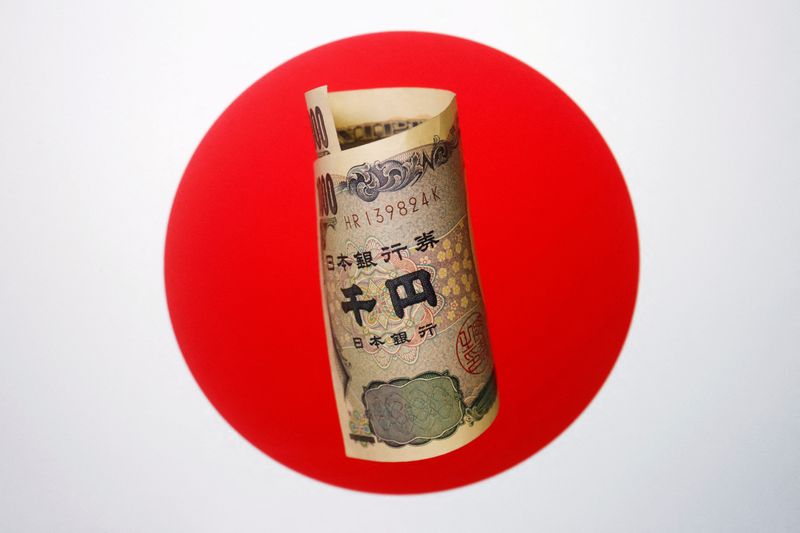By Leika Kihara and Tetsushi Kajimoto
TOKYO (Reuters) - Japanese authorities are relying heavily on psychological tactics to fight yen bears, which means keeping markets guessing about their foreign exchange intervention rather than overt attempts to arrest the currency's decline to multi-decade lows.
The battered yen has whipsawed in recent weeks, which analysts and traders attribute to government efforts to prop up the currency against a relentlessly strong dollar, amid worries about the negative economic impact of sharp yen declines.
While the Ministry of Finance (MOF) confirmed its foray into the foreign exchange market on Sept. 22, it has not commented on other suspected instances of intervention since then, including a sharp move higher in the Japanese currency on Friday.
Similarly, Japan's top currency diplomat Masato Kanda on Monday declined to comment, when the yen jumped to 145.70 against the dollar from around 149.70 in early Asia trade in another suspected yen-buying intervention.
Analysts say the strategy of staying mum keeps investors guessing on intervention, thereby discouraging speculators from testing the yen's new lows.
That contrasts with Japan's intervention after the 2011 earthquake and tsunami to quell sharp yen rises, in which authorities announced most interventions.
"With stealth intervention, authorities can give markets the impression they could be stepping in more frequently than they actually have," said Atsushi Takeda, chief economist at Itochu Research Institute. "It's a psychological tool that can limit the frequency of actual intervention."
Unlike 2011, the government's more recent interventions require selling dollars - not yen - which is more difficult as it taps into Japan's limited foreign reserves.
While its $1.3 trillion in foreign reserves is the world's second biggest, Japan drained nearly 15% of funds readily available for intervention with the Sept. 22 action alone, making regular actions costly and unsustainable.
During the Asian financial crisis in 1997-1998, the last major series of yen-buying interventions by the government, Japanese authorities in most cases did not announce whether they had stepped in.
That means Tokyo will need to rely more on its words - or its silence - rather than reserves to shore up the yen.
Speaking to Reuters on Saturday, Kanda said that for the time being, the MOF, which oversees exchange-rate policy, would stick to its stance of holding off commenting on whether it intervened.
"The MOF will probably maintain its approach of going stealth whenever it intervenes," said a government official familiar with the matter. "It's hard to see why it would suddenly want to start announcing the fact it stepped in," the official said, a view echoed by another official.
Finance Minister Shunichi Suzuki stuck to his script when approached by reporters on Monday, saying only that Japan will take "necessary" action against speculative yen moves.
WAR OF NERVES
Knowing solo intervention alone cannot reverse the dollar's broad uptrend, government officials have said any action in the currency market will be aimed at slowing sharp yen falls rather than defending a certain level.
The MOF's suspected intervention on Friday came as the yen plunged to a fresh 32-year low of 151.94 to the dollar.
By then, markets were rife with speculation Tokyo had been intervening including on Oct. 13, when the Japanese currency jumped a full yen immediately after hitting a then 32-year low of 147.665 to the dollar. Another case was on Oct. 20, when the dollar fell 46 pips immediately after rising above 150 yen.
Facing public heat for rising inflation, Prime Minister Fumio Kishida needs to show he is taking action to slow the currency's fall that has boosted import costs.
Engaging in a war of nerves with speculators is among the few options left for policymakers, particularly with the central bank showing no intention of hiking interest rates.
Investors will know how much the recent interventions cost on Oct. 31, when the MOF is expected to release monthly data.
"The idea with stealth intervention is to keep markets on edge, so it's important to be skilful and not allow traders to read your pattern," said Tsuyoshi Ueno, a senior economist at NLI Research Institute.
"Considering the recent steep rise in U.S. Treasury yields, the speed of yen falls has been fairly moderate. You could say stealth intervention may be better than nothing, though it's really just buying time."
